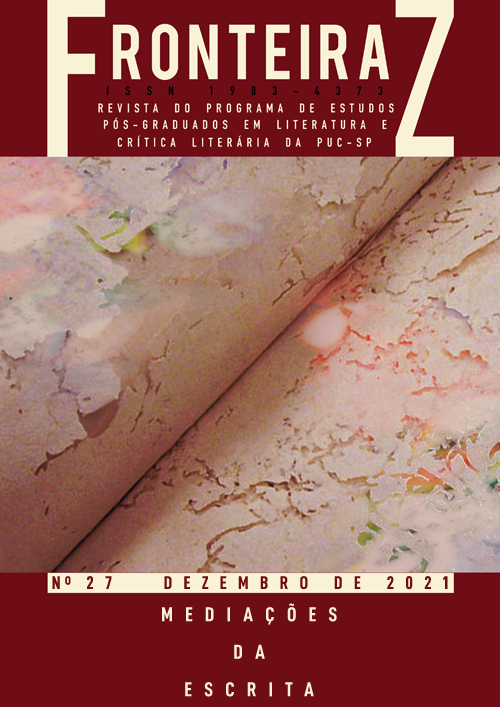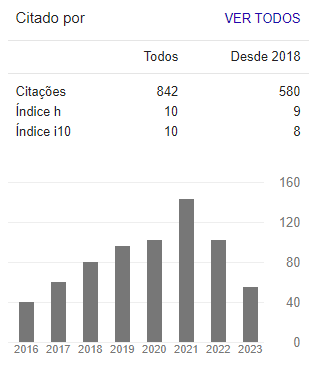Culture of connection, paranoia, burnout society, and poetics of the novel as an open encyclopedia
DOI:
https://doi.org/10.23925/1983-4373.2021i27p184-199Keywords:
Connection culture, Romance as an open encyclopedia, Contemporary poetics, Thomas Pynchon, David Foster WallaceAbstract
In the culture of connection, the feeling of excess – information, files and connections – is made more present. Such extraliterary factors influence the constitution of literary discourse, as it presents Italo Calvino (1990), in Six memos of the next millennium, when he discusses the novel as an open encyclopedia. The adjective "open" linked to the noun "encyclopedia" establishes the relationship between yesterday and today, between modernity and hypermodernity in the Big Tech culture. The identification of the polyandric aspect of contemporary narrative by Carlos Ceia (2007) also enriches the possibilities of reading the poetics of the novel as an open encyclopedia, as seen in the poetics of Thomas Pynchon and David Foster Wallace. Therefore, in this essay, we aim at presenting social and historical aspects of the information age that helps us an understanding of the poetics of the novel as an open encyclopedia.
References
CALVINO, I. Seis propostas para o próximo milênio. Trad. Ivo Barroso. 2. ed. São Paulo: Companhia das Letras, 1990.
CASTELLS, M. A sociedade em rede. Trad. Roneide Venancio Majer. 21. ed. Rio de Janeiro, São Paulo: Paz & Terra, 2020.
CEIA, C. A construção do romance: ensaios de literatura comparada no campo dos estudos anglo-portugueses. Lisboa: Almedina, 2007.
CRARY, J. 24/7: capitalismo tardio e os fins do sono. Trad. Joaquim Toledo Jr. São Paulo: Ubu, 2016.
ECO, U. Da árvore ao labirinto. In: ECO, U. Da árvore ao labirinto: estudo histórico sobre o signo e a interpretação. Trad. Maurício Santana Dias. Rio de Janeiro: Record, 2013. p. 13-101.
HAN, B-C. Sociedade do cansaço. Trad. Enio Paulo Giachini. 2. ed. Petrópolis: Vozes, 2017.
HOUAISS, A. Dicionário Houaiss da língua portuguesa. Rio de Janeiro: Objetiva, 2009.
JENKINS, H. Cultura da conexão: criando valor e significado por meio da mídia propagável. Trad. Patrícia Arnaud. São Paulo: Aleph, 2014.
KAKUTANI, M. A morte da verdade: notas sobre a mentira na era Trump. Trad. André Czarnobai. Rio de Janeiro: Intrínseca, 2018.
MATTOS, F. A cadeia secreta: Diderot e o romance filosófico. São Paulo: Cosac & Naify, 2004.
PERRONE-MOISÉS, L. Mutações da literatura no século XXI. São Paulo: Companhia das Letras, 2016.
PYNCHON, T. O último grito. Trad. Paulo Henriques Britto. São Paulo: Companhia das Letras, 2017.
WALLACE, D. F. Graça infinita. Trad. Caetano Galindo. São Paulo: Companhia das Letras, 2014.
WALLACE, D. F. E Unibus Pluram: television and U. S. fiction. In: WALLACE, D. F. The David Foster Wallace reader. New York: Back Bay Groups, 2015. p. 656-707.
WOOD, J. Tell me how it feel. The Guardian, 2001. Disponível em: https://www.theguardian.com/books/2001/oct/06/fiction. Acesso em: 26 out. 2021.
Downloads
Published
How to Cite
Issue
Section
License
Copyright (c) 2021 FronteiraZ. Journal of the Postgraduate Studies in Literature and Literary Criticism Program

This work is licensed under a Creative Commons Attribution-NonCommercial 4.0 International License.







 Este obra está licenciada com uma Licença
Este obra está licenciada com uma Licença 